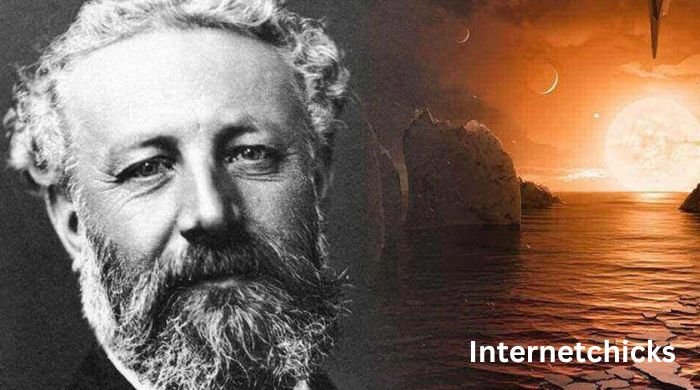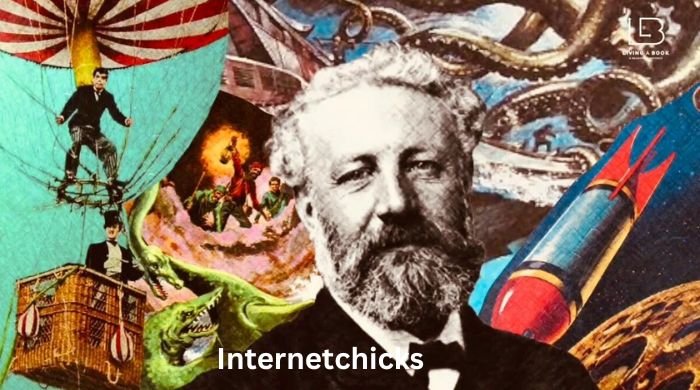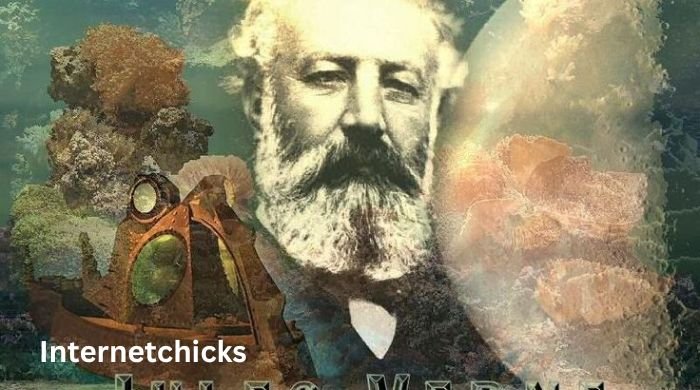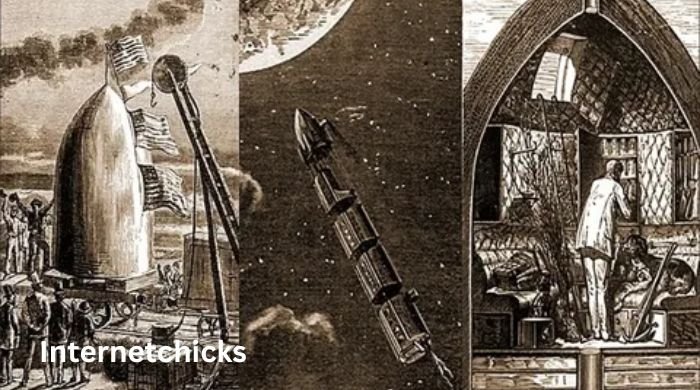Early Life and Education
Jules Verne was born on February 8, 1828, in Nantes, France. You would find this city situated along the Loire River. His father, Pierre Verne, was a lawyer, and his mother, Sophie Allote de la Fuÿe, came from a prominent family of shipowners. Jules was the eldest of five children.
- Childhood Interests:
- Loved reading adventure stories.
- Fascinated by voyages and explorations.
Jules attended boarding school at Saint-Stanislas, excelling in geography and writing. Later, he enrolled in the Lycée Royal in Nantes. His education continued in Paris, studying law to follow in his father’s footsteps.
Influences and Inspirations
In examining Jules Verne’s influences and inspirations, you’ll discover the breadth of inputs that shaped his work.
- Explorers: Verne admired explorers like Captain James Cook and David Livingstone.
- Science: The rise of scientific discoveries inspired many aspects of his writing.
- Literature: Early sci-fi works by Edgar Allan Poe and Daniel Defoe captivated him.
- Travel Logs: Accounts from globetrotters such as Alexander von Humboldt intrigued him.
- Historical Events: Technological advancements of the 19th century immensely influenced his narratives.
Understanding these facets provides deeper insight into Verne’s imaginative and predictive storytelling.
Initial Forays into Writing
Jules Verne’s early steps into the literary world are marked by a combination of curiosity and ambition. You may find it fascinating that he started with:
- Playwriting: Verne initially wrote plays, his first being Broken Straws in 1850.
- Collaborative works: He partnered with writers like Alexandre Dumas, Père.
- Short stories: He penned various short stories and essays, exploring themes of adventure and science.
This period laid the groundwork for his later masterpieces, showcasing his early drive and diverse interests. He continuously refined his style, leading to his unique voice in the science fiction genre.
Read More: The Ultimate Guide to Internet Chicks
Breakthrough Works and Success
When you think of Jules Verne’s breakthrough, “Journey to the Center of the Earth” likely comes to mind. This novel, published in 1864, was a game-changer.

- “Journey to the Center of the Earth”: Pioneered a new genre by combining adventure, science, and speculative fiction.
- “Twenty Thousand Leagues Under the Sea”:
- Introduces Captain Nemo and the submarine Nautilus.
- Explores underwater adventures.
- “Around the World in Eighty Days”:
- Follows Phileas Fogg’s race against time.
- Unveils cultural insights and geographical wonders.
Each book not only captivated readers but also etched Verne’s name in literary history.
Major Themes in Verne’s Works
You will find adventure depicted in all corners of the Earth, under the seas, and even the skies.
Exploration and Discovery
- Characters often undertake epic journeys.
- Unknown worlds are revealed with elaborate descriptions.
The Power of Technology
- Inventions and machinery play pivotal roles.
- Verne explores both the benefits and risks of technological progress.
Human Desire for Knowledge
- Intellectual curiosity drives many plots.
- Protagonists frequently seek understanding and expertise.
Conflict Between Man and Nature
- Natural elements often serve as both setting and antagonist.
- The struggle emphasizes human resilience and ingenuity.
Social and Political Commentary
- Critiques on imperialism, colonialism, and societal norms.
- Visionary ideas on future societies and governance.
Scientific and Technological Predictions
Jules Verne had an uncanny ability to predict future scientific and technological advancements. In his novel “From the Earth to the Moon,” he described space travel long before it was possible.

- Submarines: In “Twenty Thousand Leagues Under the Sea,” you’ll find a detailed description of a submarine, decades before submarines existed.
- Aerial transport: “Robur the Conqueror” predicted the rise of modern aircraft.
- Space travel: “Journey to the Center of the Earth” and other novels showcased advanced concepts of exploration and discovery.
His work continues to inspire curiosity and innovation in both science and literature.
Collaborations and Relationships
Verne’s journey was heavily influenced by others.
- Michel Carré: His collaboration with Carré led to the play “Les Pailles rompues.”
- Pierre-Jules Hetzel: This publisher recognized Verne’s talent and helped shape his career. Their partnership resulted in the first publication of “Five Weeks in a Balloon.”
- Others in the Literary Circle: Verne befriended notable writers like Alexandre Dumas and Victor Hugo, which impacted his views and writings.
- Family Support: Verne’s wife, Honorine, provided invaluable support, and his son, Michel, later helped adapt some of his works for the stage.
Later Life and Personal Struggles
In his later years, you find Jules Verne facing several personal challenges. Following the death of his mother in 1887, Verne’s life takes a somber turn. The strain on his health exacerbates as he copes with diabetes, leading to partial blindness.

Family Issues
- You note Verne’s strained relationship with his son, Michel, which remains a source of distress.
- Financial troubles plague the family after a series of poor investments.
Professional Challenges
- Despite his fame, Verne struggles with receiving the critical acclaim he feels his work deserves.
- Literary critics of the time often undermine his contributions to the genre.
“Reality provides us with facts so romantic that imagination itself could add nothing to them.” – Jules Verne
Legacy and Impact on Literature
Jules Verne’s influence on literature is substantial and enduring.
- Foundation of Science Fiction: His imaginative works laid the groundwork for modern sci-fi.
- Technological foresight: Predicted inventions like submarines and space travel.
- Literary Style: Blending adventure with scientific realism.
- World-building: Created fully immersive and detailed settings.
- Cultural Impact: Inspired numerous adaptations in film, television, and theater.
- Pioneering Themes: Addressed themes of exploration and human ingenuity.
- Iconic Characters: Introduced unforgettable figures such as Captain Nemo and Phileas Fogg.
“Anything one man can imagine, other men can make real.”
Verne in Popular Culture
Jules Verne’s works have left a lasting impact on popular culture. You can see references and adaptations in various media forms:
- Books and Comics: Many graphic novels and comic books inspired by his adventures.
- Films: Hollywood adaptations like “20,000 Leagues Under the Sea” and “Journey to the Center of the Earth.”
- Television: TV series and cartoons often feature episodes or characters inspired by his novels.
- Video Games: Games inspired by Verne’s imaginative worlds.
- Music: Bands and musicians referencing his stories in lyrics and themes.
Verne’s influence remains significant in shaping sci-fi and adventure genres.
Translations and Global Reach
When exploring Jules Verne’s global influence, you note translations as a significant factor. Verne’s works are among the most translated in history. Key aspects about translations and reach include:

- Languages: Verne’s works are translated into more than 150 languages, making them accessible worldwide.
- Impact: Foreign translations allowed his ideas to permeate various cultures and societies.
- Publishing: International publishers eagerly sought rights, spreading his adventurous tales across continents.
- Adaptations: Films, TV series, and theatre productions in multiple languages translated his written word into visual storytelling.
- Education: His books are in school curricula globally, instilling wonder in young readers.
Modern Interpretations of Verne’s Works
You may discover that Jules Verne’s works have continuously inspired various modern adaptations.
- Film and Television: Numerous movies and TV series are based on Verne’s books, like “Journey to the Center of the Earth” and “20,000 Leagues Under the Sea.”
- Literature: Writers often update Verne’s themes for contemporary readers, incorporating modern technology or cultural shifts.
- Comics and Graphic Novels: Verne’s stories have been retold in visual formats, attracting a younger audience.
- Video Games: Titles such as “Return to Mysterious Island” offer immersive experiences based on his novels.
“Reality provides us with facts so romantic that imagination itself could add nothing to them.” – Jules Verne
Frequently Asked Questions Jules Verne
- Who was Jules Verne?
- Jules Verne was a French author best known for his adventure novels, particularly the “Extraordinary Voyages” series.
- What are Jules Verne’s most famous works?
- Twenty Thousand Leagues Under the Sea
- Journey to the Center of the Earth
- Around the World in Eighty Days
- When was Jules Verne born?
- Jules Verne was born on February 8, 1828.
- Where did Jules Verne live?
- Verne lived in Nantes, France, for much of his early life before moving to Paris.
- Did Jules Verne invent science fiction?
- Jules Verne is considered a pioneer of the science fiction genre.
- What themes did Jules Verne explore in his books?
- Verne frequently explored themes such as adventure, exploration, and innovation.
- Are Jules Verne’s books historically accurate?
- While Verne aimed for scientific accuracy, some details are speculative or outdated by modern standards.
Conclusion
You have now explored the fascinating life of Jules Verne, a pioneer in science fiction literature. His works, including Twenty Thousand Leagues Under the Sea and Journey to the Center of the Earth, are essential readings for any literary enthusiast.
- Verne’s Background:
- Born on February 8, 1828, in Nantes, France
- Studied law but chose writing as his profession
- Literary Achievements:
- Known as the “Father of Science Fiction”
- Authored over 60 books and numerous short stories
“Science, my lad, is made up of mistakes, but they are mistakes which it is useful to make, because they lead little by little to the truth.” – Jules Verne
Understanding Verne’s contributions helps you appreciate the evolution of modern science fiction.

